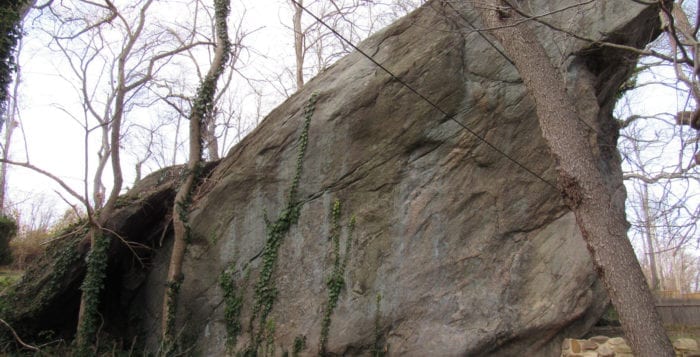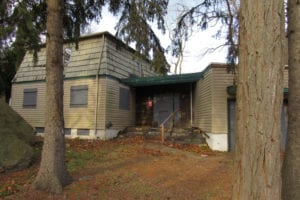Controversy over purchasing Rocky Point rock

By Erin Dueñas
The massive boulder that sits in front of the boarded-up house at 30 Sam’s Path in Rocky Point looms large in the childhood memories of Annie Donnelly, who grew up there. When she was 8 years old, the rock was the place to be in the neighborhood — the place local kids would gather for use as a clubhouse or a fort or even just to climb. Years later, teens would find the rock made a great place for a first kiss or a first swig of beer.
“It was the focal point for so many of us,” said Donnelly, who is now retired and living in Florida. “It was the go-to place for many of our first times in those days.”
The rock, which measures 50 feet long and 35 feet high, was even the site for Donnelly’s wedding reception in 1971.

“There was a dance floor built by my dad behind the rock and we decorated it with flowers from around town,” she said. “It was an enchanted wedding.”
With her fond memories, it comes as no surprise that Donnelly supports efforts spearheaded by Suffolk County legislator Sarah Anker to acquire the property and turn it into a “pocket park.” Donnelly recalled that her father never minded when kids played on the rock, even though it sat on his front lawn. “Any kid could use it,” she said. “We knew it belonged to the town and everyone in it.”
According to Anker, efforts to acquire the property where the rock sits began after campaigning in the area last year, and listening to neighbors who weren’t concerned with the rock, but more with the dilapidated, empty house behind it.
“Neighbors asked about doing something with the zombie home,” Anker said. “Revitalizing the property was the main objective of the initiative.”
Anker pointed out that she never submitted legislation for the county to purchase the property with tax dollars like it’s been reported — stressing that public funds would not be used to purchase it. She said she is in talks with several not-for-profit organizations including the Nature Conservancy and the Peconic Land Trust, who may have an interest in helping to purchase the property for public use. The house was purchased though, last year, for $107,000, and the current owner has signaled that he could be willing to sell.
While some like Legislator Rob Trotta (R-Smithtown) says it’s “preposterous” and “embarrassing” to buy a rock, community members and historical leaders view the piece of property differently.
“Rocky Point is very proud of this rock,” said Rocky Point Historical Society President Natalie Aurucci Stiefel. “It’s a natural wonder and the town takes pride in it.”
“Neighbors asked about doing something with the zombie home. Revitalizing the property was the main objective of the initiative.”
—Sarah Anker
She said that the rock is likely how Rocky Point got its name. Local legend contends that it was once a spot frequented by Native Americans in the area, lending it its nickname, Indian Rock. Stiefel said that like many of the rocks on the North Shore, the boulder was deposited from glaciers thousands of years ago.
Anker said that there are many benefits to revitalizing the spot, which as it stands now, depreciates the value of the entire community. She noted the historical and natural value of the rock, as well as value of remediating the blighted area.
“There’s also the educational value,” she said. “I imagine a child looking at that boulder from thousands of years ago in awe.”
Dot Farrell, of Sound Beach, said she passes the rock frequently and considers herself sensitive to the historical significance it plays in the town. But she has reservations about what the acquisition of the property could mean for the town.
“Pocket parks become drug hangouts,” she said. “We don’t need another one.”
She also questioned where the money would come from to maintain the property, even if the initial purchase was made without tax dollars.
“It’s going to need ongoing upkeep and there are so many other things to spend money on,” she said. “I prefer my town didn’t take on anymore obligations that they don’t need. I want my town to be as fiscally savvy as I try to be.”






